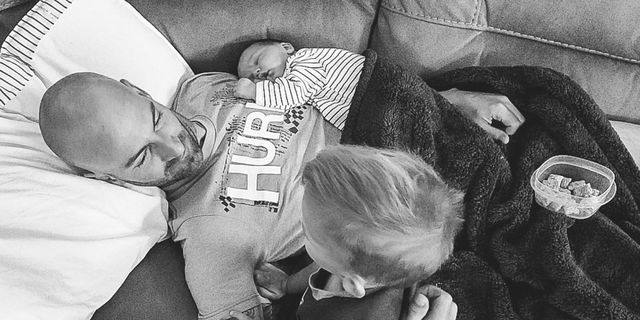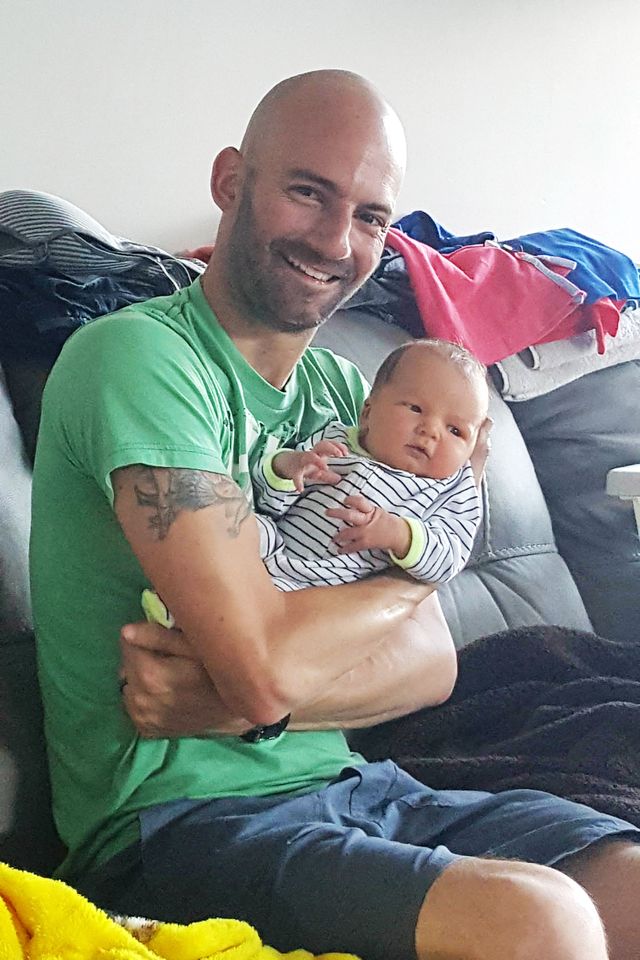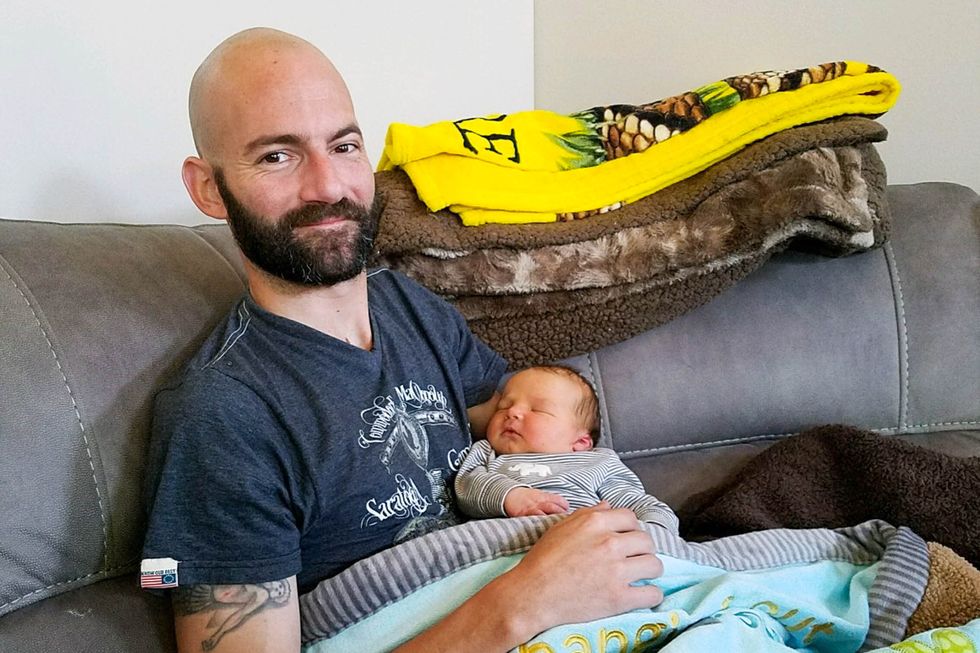About a year ago, JP Morgan nabbed some positive headlines when it announced that it was expanding its paid family leave policy from three to four months for primary caregivers.
"A lot of people in our demographic are having children, and this is something that just helps support them at these critical moments that take place in life," the company's head of human resources told Business Insider about the change at the time. "First and foremost, take care of your health… Take care of your family — however you define family."
So when Derek Rotondo was getting ready to welcome his second son last month, he assumed he'd be able to get 16 weeks of paid time off to spend with his two-year-old, new infant, and his wife. Rotondo has worked for JP Morgan for the last seven years. Although he knew that only primary caregivers could claim the full time off, he figured he could qualify. "I thought it was sort of intentionally vague to allow families to make that decision themselves," he said. "But as I found out, it was not."
Rotondo was told that because he's a father, he could only be classified as a primary caregiver and get all 16 weeks if he proved that his wife had either gone back to work already or was "medically incapable" of caring for their son. His wife is a teacher who is currently on summer vacation, and she, thankfully, had an uncomplicated delivery and is doing well.
So JP Morgan considers him to be a secondary caretaker. But that's not how he sees himself. "I would consider myself absolutely equal," he said. While he joked that he hasn't counted to see whether he's changed 51 percent of the diapers, he noted that he shares in those duties, feeding, and calming when his infant son is upset.
Yet all that Rotondo got after his son was born on June 6 was two weeks of paid paternity leave. He's hoping to eventually add on more time either through unpaid FMLA leave or accrued paid time off.
When I spoke with him a few weeks ago, he had just gone back for his first day of work. It was rough. "I was up pretty early this morning but it took me a while to actually get out of the door," he said. It wasn't because of his two-year-old; his son was still asleep. He just didn't want to leave. "It was me dragging my feet."
He and his wife aren't completely sure how they'll make it work now that he has to go back to work. "We're still kind of figuring that all out," he said. He texted with his wife to see how it was going throughout his first day. As of the morning, it was smooth, but the two-year-old gets more energetic in the afternoons. His wife much preferred having him around so they could take shifts and she could nap when tired during the day. "It's still kind of a work in progress."
And both times he's had to take short leaves, it's been hard on him. "With our first son, she'd send me pictures and stuff like that throughout the day," he recalled. "It just gives you a little pang every time he's doing something cute, when he first started cooing…first smiles. Those things are tough."
Even today when more and more fathers take leave and are involved in raising their children, JP Morgan isn't unusual in having a policy that offers much more to new mothers than it does to new fathers. In a recent study looking at the paid leave policies of the country's 44 largest employers, JP Morgan among them, seven provide significantly less leave—a gap of at least eight weeks—to fathers and adoptive parents than to birth mothers. Another eight don't give these parents any paid leave at all. Just 10 provided equal leave to all mothers and fathers.
This doesn't just hurt the men who want to be equally involved in their children's care and share the work with their partners. It hurts women, too. Men who take time off when their children arrive end up being more involved in their children's care and more committed parents later on in their children's lives. That's good for children, but it also helps take some of the burden off of their female partners.
The amount of leave also matters. In Quebec, five weeks of guaranteed paid leave was reserved for fathers, thus incentivizing them to take that time off. The policy increased how much time fathers spent caring for their children and taking care of the household by 23 percent. That, in turn, meant mothers became more likely to be employed full time and work longer hours; their incomes increased more than 25 percent. In Sweden, which has a similar "daddy quota," mothers' incomes rise 7 percent for every month of leave their husbands take.
These results make sense: In heterosexual couples, if a father has to go back to work early, an infant's care will almost inevitably fall to his wife. That makes it harder for her to get back to paid work. And once those unequal habits are put in place early on, it's hard to get back to an equitable split later.
One study of a "daddy quota" in Germany even found that not only did it incentivize individual men to take leave, it also ended up changing the whole society's view of gender norms.
It's this bigger picture that motivated Rotondo to do something about his experience. He wasn't just upset about what he might miss or the care he won't be able to share with his wife. He was also upset about the principle at work. "The more I thought about it, it was the thinking that was so backwards…that really bothered me," he said. "It's reinforcing and assuming that, well, a mom can take care of that, that's why they're there."
So Rotondo took a big step: He filed a discrimination charge against his employer with the Equal Employment Opportunity Commission, alleging that JP Morgan violated laws that prohibit gender bias "by denying [fathers] caretaking leave on the same terms as mothers based on their sex and sex-based stereotypes."
"If I were a female employee of [JP Morgan], I would be presumptively eligible to receive 16 weeks of paid parental leave automatically," he writes in his charge. Its policy also "relies upon and enforces a sex-based stereotype that women are and should be caretakers of children, and that women do and should remain at home to care for a child following the child's birth, while men are not and should not be caretakers and instead do and should return to work shortly after the birth of a child."
Filing the charge with the EEOC is the first step in what Rotondo hopes will eventually become a class action lawsuit covering all men who work for JP Morgan and have been affected by its policy. "This is the first case of its kind in the private sector," said his attorney, Galen Sherwin, who is a senior staff attorney at the Women's Rights Project at the ACLU. Now they're looking to connect with other fathers who have had to take less leave. "We're very interested in hearing from other people who are affected," she said.
Rotondo may be the first to take this kind of step, but he's not the only father who struggles to balance raising his children and the demands of work. About half of American fathers worry they spend too little time with their children, about double the share of moms who feel that way, and around the same share say it's hard to balance jobs and family. Around a third of fathers in white-collar workplaces want to share child rearing equally but, in reality, their wives do more.
Although lawsuits can be complicated and take years to resolve, it wasn't a difficult decision for Rotondo. "It was just sort of a matter of how far am I willing to take something when it's the right thing to do," he explained. "To me, that answer is pretty much always as far as necessary."
He wants the lawsuit to spur JP Morgan and other employers to change their policies so that they're more inclusive. He also hopes it'll spark a conversation.
"Updating [the policy] to get more in touch with modern families is something that will definitely benefit everyone with the company," he said. On top of that, "I would hope that it would have more broad reaching effects for other large corporations and people in general."
"The thinking behind it is definitely something that we need to move past," he added.















